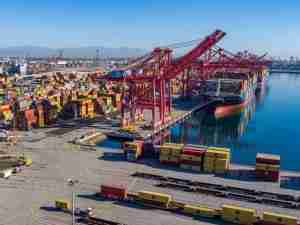Paul Bea, chairman of the Coastwise Coalition, based in Washington DC, announced that a new effort to eliminate the Harbor Maintenance Tax for domestic shipping is being mounted by Congressman Pat Tibieri (R-OH).
In an April 15th email, Bea said: “I am pleased to report that yesterday Congressman Pat Tiberi (R-OH) introduced harbor maintenance tax exemption legislation (HR 1533). Original co-sponsors are Steve LaTourette (R-OH) and Brian Higgins (D-NY). This is the first HMT (harbor maintenance tax) exemption bill to be introduced in this 112th Congress. Mr. Tiberi is on the Ways & Means Committee. It is no small thing to note that he also chair of the Select Revenue Measures Subcommittee and thus will have an important role to play in the committee’s bill writing in the months ahead.”
Bea told the AJOT last September that the exemption to the tax is an important priority to support development of marine highway shipping in the United States:
“There is a tax assessed on domestic waterborne freight, the Harbor Maintenance Tax (HMT), which needs to be eliminated. The tax applies to imported cargoes entering the US and domestic waterborne shipments. This makes coastal shipping of non-bulk cargo like intermodal containers and trailers less attractive. The tax is assessed for cargoes entering ports such as Oakland, but this tax would also apply to freight being transported by water between Oakland and, say, Seattle. The tax is assessed at 0.125% of the value of the cargo, but there is no such tax assessed on cargoes going by road or rail. Several proposals in Congress seek to eliminate the tax on non-bulk cargo in domestic shipping, but need to wait for the tax committees to take up a large tax bill that can serve as a vehicle for the smaller HMT issue.”
The effort by Congressman Tibieri should provide new support for this effort.
The Coastwise Coalition represents maritime and other transportation advocates of marine highway shipping for the United States.
One of the beneficiaries of this effort could be New York City-based American Feeder Lines which announced it will be launching a feeder ship service linking Boston, Portland, Maine and Halifax in the 2nd quarter of this year.
In March, the AJOT reported that AFL’s executives have said that Phase 1 will concentrate on developing the international trans-shipment business with a new emphasis on bringing in BCOs (beneficial cargo owners) as well as the ocean carriers. However, what has put a gleam in the eye of AF:L executives is the introduction of “Jones Act” services. The Jones Act, which allows a vessel to work between two US ports, requires the operator to build the ship in the US and to man the ship with a US crew. AFL says it has already been in discussions with Bay Shipbuilding in Wisconsin and Aker in Philadelphia about building the next generation of feeder box ships.
Critics have argued that the cost of building and running these ships is too expensive. But one mile of highway costs an estimated $35 million to build while the cost of a feeder ship built in the US is, even with the high costs of domestic shipyards, likely to be less than two miles of roads.
The passage of the HMT exemption by Congress would lower costs to shippers and help American Feeder Lines feeder ship dream come closer to reality.










